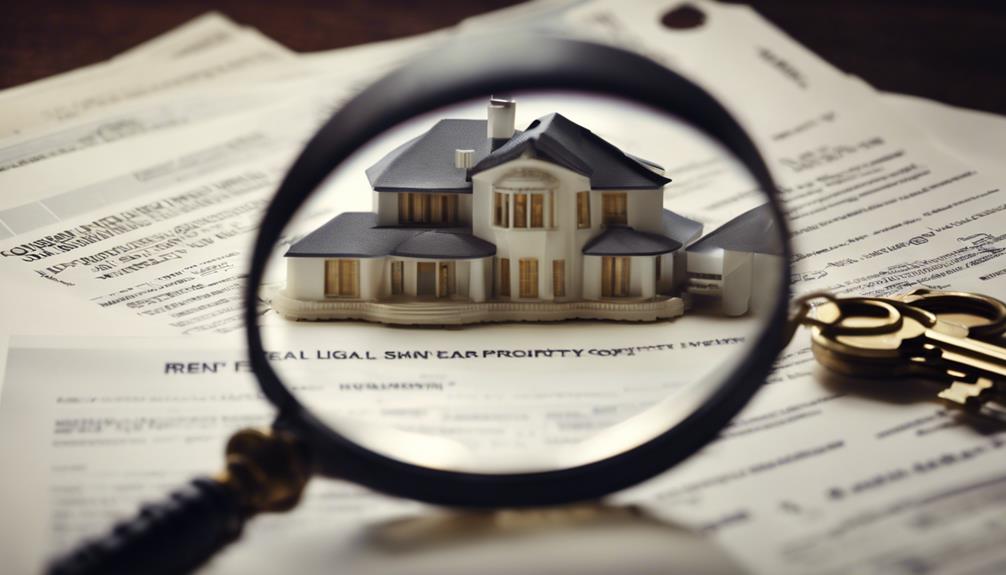Revealing rental property investment secrets starts with knowing your options. You can choose between residential and commercial properties, each with unique risks and rewards. To maximize returns, focus on property valuation by researching locations, recent sales, and potential developments. Use the 1% rule to evaluate investment potential, ensuring your rental income aligns with your purchase price. Don't forget financing; lower down payments can lead to higher interest rates. Finally, effective property management and tenant satisfaction play significant roles. Stick around to uncover strategies that will elevate your investment journey further.
Key Takeaways
- Focus on location and market trends to identify properties with high investment potential and future appreciation.
- Utilize the 1% rule to evaluate if a property's rental income meets your investment criteria.
- Research financing options carefully, considering down payment sizes and interest rates to maximize profits.
- Regular maintenance and tenant communication are essential for retaining tenants and minimizing turnover costs.
Types of Rental Properties
When considering rental property investments, you'll typically choose between residential and commercial properties, each with its own unique benefits and challenges.
Residential properties, like single-family homes or multi-unit buildings, generally have lower starting costs and easier mortgages. They attract a wide range of tenants, from families to students, ensuring a consistent demand.
On the other hand, commercial properties cater to businesses and often involve more complex financing options. While the potential for higher returns exists, the risks can be greater.
As you weigh your options, think about your investment goals, financial situation, and the market dynamics in your area.
Ultimately, understanding these types of properties helps you make informed decisions for your rental portfolio.
Understanding Property Valuation

Understanding how to value a property is essential for making informed investment decisions, whether you're considering residential or commercial options.
Start by analyzing the location; properties near commerce and good schools typically hold higher value. Research recent comparable sales to gauge market trends and set realistic expectations.
Look for upcoming developments that could influence property desirability and prices. Additionally, consider factors like the property's condition and unique features that may affect its worth.
By combining these elements, you can arrive at a fair valuation that aligns with your investment goals.
Evaluating Investment Potential

Evaluating investment potential requires a careful analysis of various financial and market factors to guarantee a profitable return.
Start by appraising the property's location, as proximity to amenities and quality schools enhances desirability.
Next, research local market trends and comparable sales to determine an appropriate valuation.
Apply the 1% rule, aiming for rental income that equals at least 1% of the property's purchase price. This helps assure profitability.
Don't forget to take into account additional factors like cash flow, property condition, and local tax rates.
Financing Your Investment

Financing your investment involves choosing the right mortgage options and understanding how your down payment can impact your overall costs.
You'll encounter various mortgage types, such as fixed-rate and adjustable-rate loans. A larger down payment, typically around 20%, can help you secure lower interest rates, reducing your monthly payments. Conversely, a smaller down payment often results in higher rates, which can eat into your profits.
Consider mortgage terms that fit your financial strategy, usually ranging from 15 to 30 years. Always assess the total costs, including interest and fees, to guarantee your investment remains profitable.
Legal Considerations for Buyers

Before you make a purchase, it's vital to verify the property's title and confirm there are no outstanding liens. This protects you from inheriting debts or legal issues linked to previous owners.
Consider obtaining title insurance, which safeguards against undiscovered problems that could arise after your purchase.
Don't forget to check property tax receipts to verify all taxes are paid, preventing unexpected liabilities.
A professional inspection is also important, as it can uncover hidden issues that may affect your investment.
Finally, review and sign a clear purchase agreement that outlines the price and terms of sale, making sure everyone understands their responsibilities.
Taking these legal precautions can save you headaches down the line.
Managing Your Rental Business

Once you've secured your property and handled the legal aspects, it's time to focus on effectively managing your rental business to maximize profitability and tenant satisfaction. Here are some key strategies to contemplate:
- Regular Maintenance: Keep your property in top shape to retain tenants and avoid costly repairs.
- Effective Communication: Build strong relationships by promptly addressing tenant concerns and inquiries.
- Market Analysis: Stay updated on local rental trends to set competitive rates and attract new tenants.
Innovative Trends in Real Estate

Innovative trends in real estate are reshaping how investors approach property management and tenant engagement.
You'll find technology playing a vital role, with tools like virtual tours and digital lease signing making processes smoother. Smart home features, such as energy-efficient appliances and automated systems, are becoming standard, attracting tech-savvy renters.
Additionally, co-living spaces are gaining popularity, offering flexible leasing options that cater to younger tenants seeking community.
Sustainability is another key trend; properties with eco-friendly designs not only appeal to environmentally conscious renters but can also lead to lower operating costs.
Strategies for Long-Term Success

To achieve long-term success in rental property investment, it's essential to develop an all-encompassing strategy that prioritizes tenant satisfaction and property maintenance. Focusing on these areas not only retains tenants but also boosts your property's value.
Consider these strategies:
- Regular Maintenance: Address repairs promptly to keep tenants happy and reduce turnover.
- Transparent Communication: Foster open lines of communication with tenants to build trust.
- Market Research: Stay informed about local market trends to adjust rental rates effectively.
Implementing these strategies will help you forge a sustainable and profitable rental property investment journey.
Frequently Asked Questions
What Are the Tax Benefits of Owning Rental Properties?
Owning rental properties offers you tax benefits like deducting mortgage interest, property depreciation, and certain expenses. You can also offset rental income with losses, potentially lowering your overall tax liability and increasing your cash flow.
How Do I Find Reliable Tenants for My Rental Property?
To find reliable tenants for your rental property, advertise widely, screen applicants thoroughly, check references, and conduct background checks. Establish clear communication and set expectations during the application process to guarantee a good tenant fit.
What Should I Include in a Rental Lease Agreement?
“Better safe than sorry,” so make certain your rental lease includes tenant responsibilities, payment terms, maintenance obligations, duration, and termination clauses. Clear communication prevents misunderstandings, helping you maintain a positive landlord-tenant relationship throughout the lease.
How Can I Effectively Handle Tenant Disputes?
To effectively handle tenant disputes, you should listen actively, document everything, and communicate clearly. Try finding common ground and be open to compromise. If needed, consider mediation or legal advice to resolve issues fairly.
What Are the Risks of Investing in Rental Properties?
Investing in rental properties carries risks like unexpected maintenance costs, fluctuating market values, and tenant issues. You've got to stay informed, manage finances wisely, and be prepared for potential vacancies or legal disputes.
Conclusion
As you stand on the threshold of rental property investment, remember that knowledge is your key to accessing opportunities.
Each decision you make is like planting a seed, nurturing it with research and strategy, allowing it to grow into a flourishing income stream.
Embrace the journey with confidence, knowing that the right insights can illuminate your path to success.
With every challenge, you'll find the chance to cultivate not just wealth, but a legacy to pass on.









